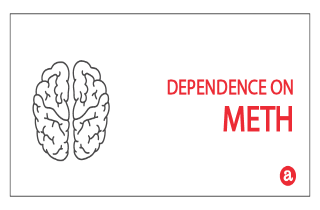It is very easy to become physically and mentally dependent on meth or methamphetamine . In fact, dependence is an expected outcome of how methamphetamine works. However, meth dependence can signal addiction.
So what are the symptoms of both physical and psychological dependence on meth? And who can help meth addiction? If you need to identify dependence on meth or are concerned about meth overdose, read on for more information. Then, we invite your questions about meth dependence or addiction at the end.
Meth dependence versus addiction
The main difference between dependence and addiction is INTENT of use. Meth addicts use meth for psychological reasons. People dependent on meth use meth to avoid withdrawal symptoms. However, for meth users this is a very fine line that somettime doesn’t even exist. How is dependence different than addiction?
Dependence refers to a state during which a person is dependent upon a drug for normal physiological functioning. And when you stop taking that drug, withdrawal symptoms occur. In this case, abstinence from the meth produces withdrawal reactions that constitute the visible evidence for dependence. On the other hand, addiction refers to a behavioral syndrome where the user of meth becomes preoccupied to the point of obsession about obtaining more of the drug. And drug use is central to life.
Dependence on meth symptoms
“Dependence is a pattern of substance use that leads to clinically significant impairment or distress “ (American Psychiatric Association, 1994). Using this definition from the DSM-IV, dependence on meth is measured by three or more of the following criteria, occurring at any time in the same 12 month period:
Tolerance, as defined by either:
a) need for increased amounts of meth to achieve intoxication or the desired effect; or
b) diminished effect with continued use of the same amount of meth.
Withdrawal shown by either of the following:
a) characteristic meth withdrawal syndrome; or
b) meth or closely related substance use to relieve or avoid withdrawal symptoms.
Physical dependence on meth
Physical dependence on a substance is defined by the appearance of withdrawal symptoms when use of the substance is discontinued. Physical dependence on meth is characterised by:
- fatigue
- fever
- nausea
- shaking hands
- sweating
- tachycardia
Psychological dependence on meth
Psychological dependence is a dependency of the mind, and leads to psychological withdrawal symptoms (such as cravings, irritability, insomnia, depression, anorexia etc). Addiction can in theory be derived from any rewarding behavior, and is believed to be strongly associated with particular areas of the brain’s reward system
Meth dependence withdrawal
The severity and length of withdrawal symptoms vary from person to person along with the amount of damage done to the normal reward system through methamphetamine use. The DSM-IV characterises meth dependence withdrawal including dysphoric mood (sadness) plus two of the following:
- constipation
- drug craving
- extreme irritability
- fever
- muscle spasms
- nausea
- shaking
- sweating
- tachycardia
The duration and severity of a typical withdrawal syndrome for methamphetamine remains unclear although there is some evidence to suggest that the majority of symptoms will resolve within two weeks of ceasing meth use, with some gastrointestinal related symptoms persisting for a further 1 to 2 weeks.
Suspect that you or a loved one have developed dependence or addiction to illicit meth or to Methedrine (brand name for a medication containing methamphetamine hydrochlorde)? Seek medical help to quit! Detox and withdrawal can be dangerous and lead to relapse if you try to quit cold turkey and on your own. Also, learn more about the addiction treatment process and available options for rehab in our Methedrine Addiction Treatment Programs and Help GUIDE for safe and successful quitting.
Meth dependence time: How long to be dependent on meth?
The speed with which you become addicted to a substance varies with the substance, the frequency of use, the method of use, the intensity of pleasure, and your genetic and psychological susceptibility. How long it takes to become dependent on meth depends on the frequency of use. If you use methamphetamine several times per week, you are likely to manifest at least some symptoms of dependence within a 4 to 6 week period.
Meth dependence questions
If you still have questions about meth dependence, addiction or treatment options please contact us or let us know. We’ll be happy to help. We invite your questions, comments, or feedback in the comments section below.









Related Posts